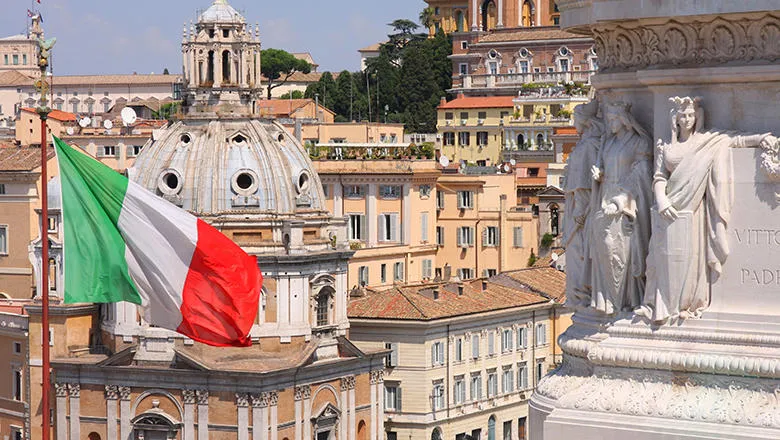27 August 2019
In a country concerned about sexual harassment, why did #MeToo fail to gain traction in Italy?
Sonia Teanio
SONIA TEANIO: Italians care about tackling sexual harassment and violence, we just need greater to link the causes of this with the way women are treated in society as a whole.

This is part of a blog series from undergraduate and master's students who participated in internships and work experience schemes at the Global Institute for Women's Leadership.
When asked what they thought were the main issues facing women and girls in their country, the majority of Italians said they were most concerned about sexual harassment and violence. In this context, the #MeToo movement should have been fully embraced. However, in reality the movement has had a negligible response among Italians. So why was this the case?
If we look more closely at the data from two consecutive Ipsos MORI surveys on global attitudes towards gender equality, in both 2018 and 2019 sexual harassment, sexual violence and domestic violence topped the list of concerns for Italians. However, the same surveys show that Italian citizens are far less concerned about gender stereotyping and the sexualisation of women in the media. More than half of the survey respondents agreed that the phenomenon of women’s violence was “over talked” and 62% agreed that "women use their physical appearance in order to be successful.”
These contradictory findings in the data reflect an issue that goes to the heart of gender inequality in Italy – how can we properly deal with sexual violence and harassment, when society is de facto promoting sexualisation and gender stereotypes?
The findings also explain the lack of support for #MeToo, as Italians see it more as a campaign to tackle gender stereotypes and the sexualisation of women, both of which scored low in the survey, rather than a campaign about sexual harassment and violence. Given that stereotyping and objectification of women form a common part of daily life in Italy, people perhaps underestimate the link between this aspect of gender inequality and the more serious issues.
So, what were the barriers to #MeToo resonating in Italy? The Italian media coverage of the controversial case of Asia Argento, one of the first women to report allegations against Harvey Weinstein in the US, brought the movement to a halt before it had barely begun. Firstly, she was portrayed as a liar, because she had waited years before reporting, then she was accused of having sexually abused a young male actor. This meant that the movement suffered from a lack of credibility from the start – thus, Jason Horowitz in the The New York Times defined the Italian #MeToo movement as a “Meh”.
The Italian hashtag used for the #MeToo on social media was #quellavoltache (#thattimewhen). Yet, the problem was that women who reported were blamed for seeking success or making money out of it or because they wanted to destroy someone’s reputation. For example, three women accused Fausto Brizzi, an Italian film director, of sexual harassment and were accused of “being stupid” and “having it coming”, particularly on social media. Italian women were not believed when they reported incidents. This is backed up in the Ipsos data, which shows that the second most common reason why people in Italy do not intervene when they witness an act of violence towards women is because they assume the woman lied regarding the severity of the act.
Why is there so much mistrust when it comes to women reporting harassment and violence? Again, gender stereotypes have always played a crucial role in Italian social norms. Berlusconi’s scandals and his “bunga bunga” private parties with young female entertainers were clearly the tip of the iceberg when it comes to the objectification of women. The former President was and still is perceived as the “Italian gigolo” who entertained himself in the company of women, and just happened to be political leader of the country with a wealthy and powerful success story. This contributes to the myth of the “strong man” dominating and objectifying women, and enhances the social norm that women who want to reach certain jobs are more likely to get them if they are beautiful and if they have the recommendation of wealthy men.
To this extent, it is not surprising that whenever women victims put their head above the parapet as part of #MeToo they were blamed rather than the perpetrators. Similar accusations apply to rape and abuse in Italy – women are interrogated over what they were wearing and how they behaved. In September 2017, two Italian police officers raped two American exchange students when they were walking them home. During the trial, the students were questioned by the defence with queries such as: “Were you wearing underwear that night?” and “Do you find men who wear a uniform sexy?”. Ironically, one of the defence’s lawyer's was a woman.
We need to recognise the deeply-rooted social norms in Italy which, despite people’s concerns about sexual harassment, affect their perception of it in reality and its representation in the media, exemplified in the lack of interest in #MeToo. Changing societal norms will be a long process, but one solution in the short-term might be to reestablish a woman minister for the Department of Equal Opportunities, tasked with the role of dealing with women’s issues. Clearly Italians care about tackling sexual harassment and violence, we just need greater awareness to link the causes of this with the way women are treated in society as a whole.
Sonia Teanio is a master’s student in Public Policy at King’s College London and interned at the Global Institute for Women’s Leadership in spring 2019. She is currently working on her dissertation about gender stereotypes within the phenomenon of domestic violence in Italy.
